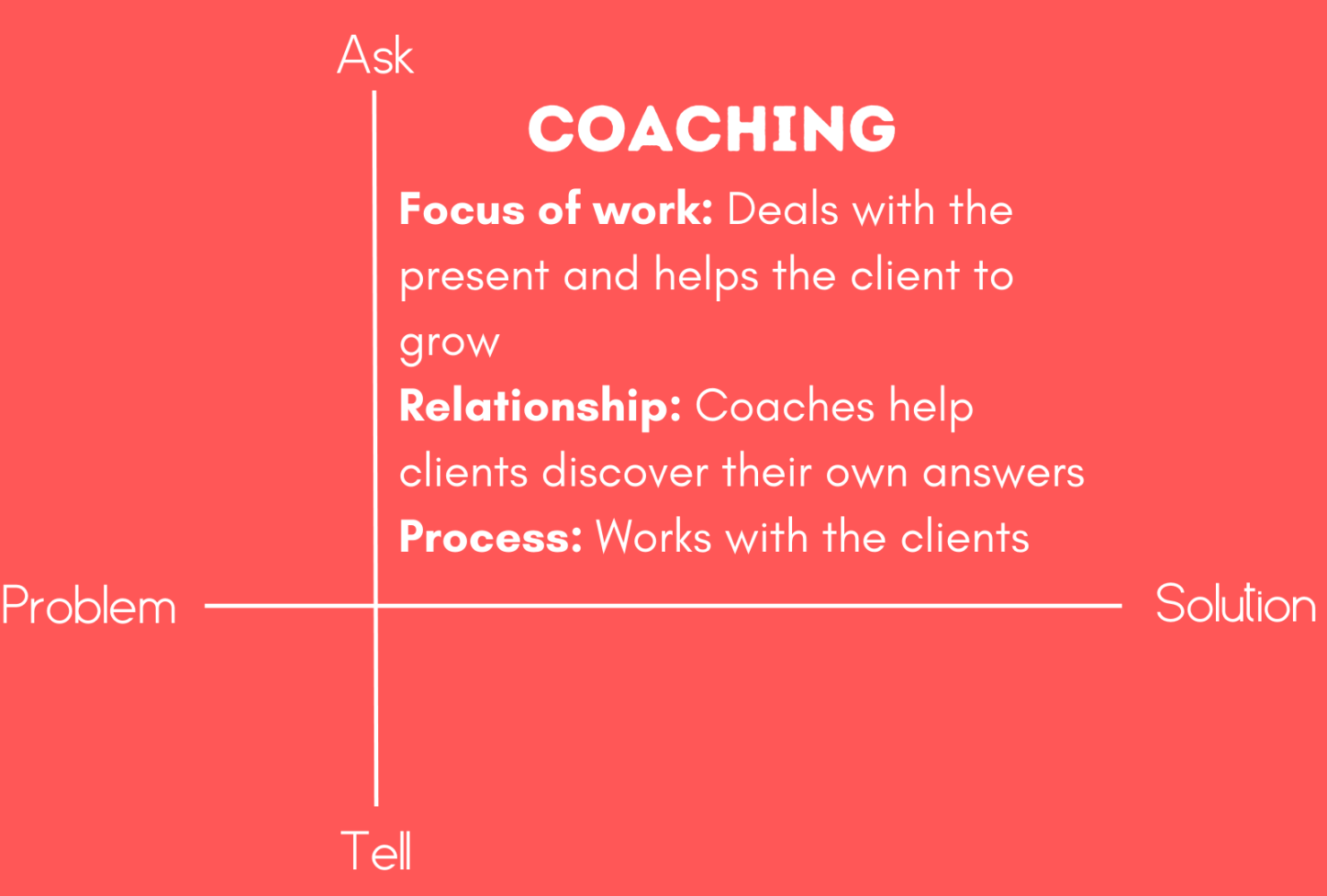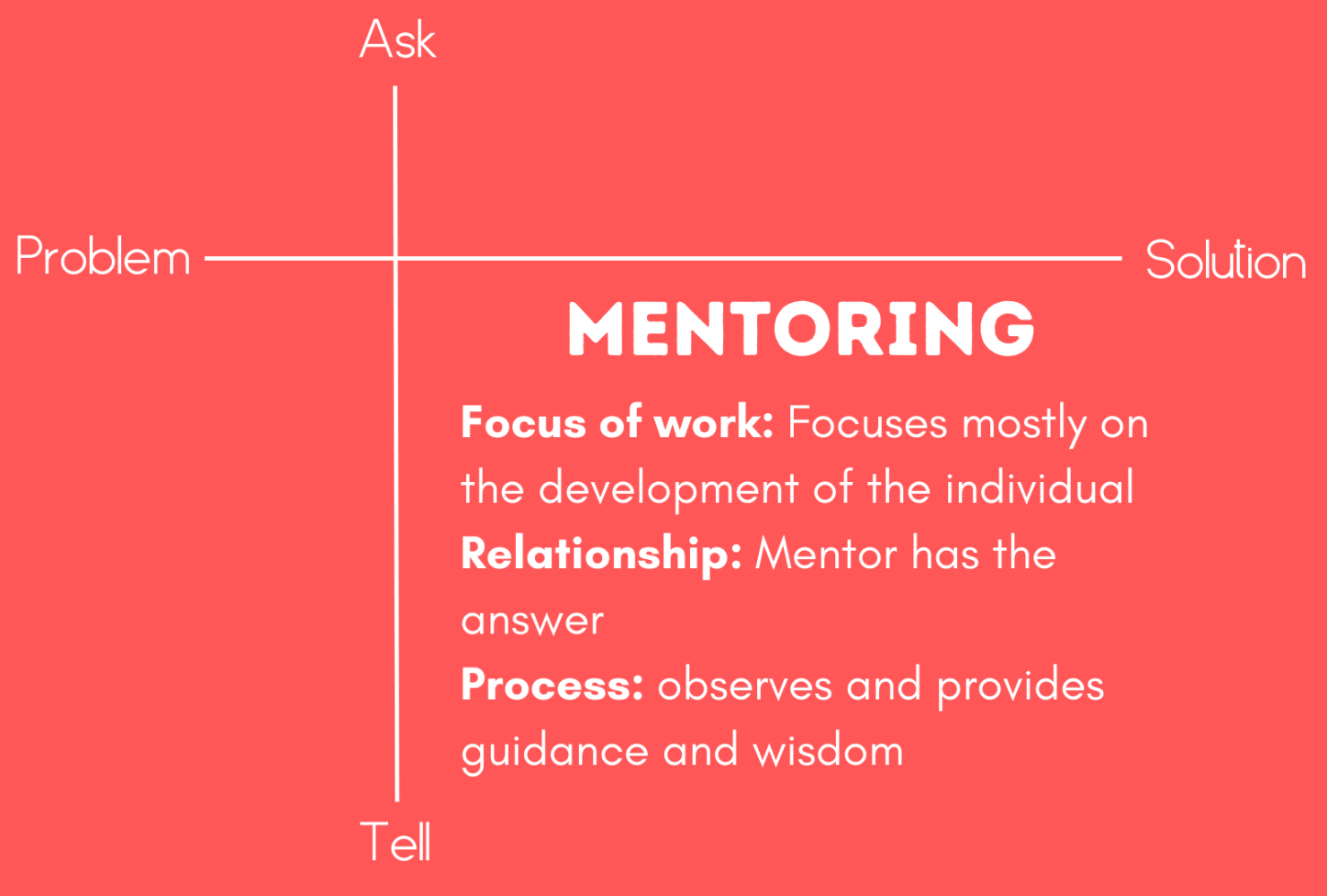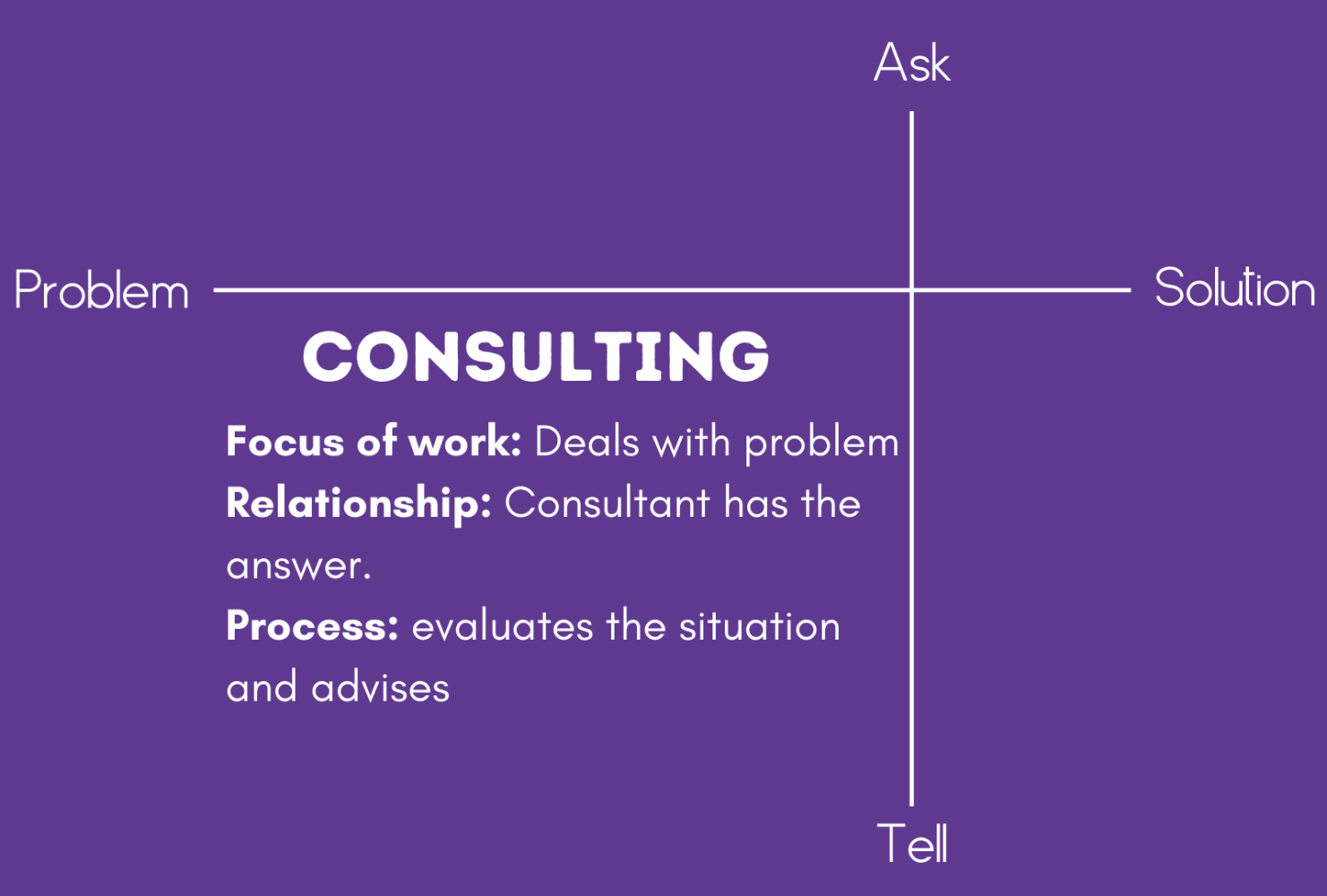Coaching, Mentoring, or Consulting: What fits your business best?
Discovering the appropriate guidance and support for your business is a challenging task. Since there are so many choices, you need to pick carefully to make sure it matches well with your specific goals and needs. Coaching, mentoring, and consulting emerge as the three prevalent paths among the various choices, each possessing its unique set of advantages and applications.
Thus, the decision-making process becomes pivotal for entrepreneurs and business leaders, yet a time-intensive and demanding endeavor.
This article discusses the specific facets of coaching, mentoring, and consulting, shedding light on their respective offerings, disparities, and their potential compatibility with your business’s pursuit of success.
What are Business Coaching, Mentoring, and Consulting?
Business coaching, mentoring, and consulting represent distinct yet interconnected practices, each serving as a valuable source of guidance and expertise for business leaders. Consequently, gaining a comprehensive understanding of each of these practices is crucial to selecting the most appropriate one that aligns with your specific needs and goals.
Business Coaching:
Business coaching is like a partnership between a coach and a business owner or professional. The coach helps people reach their personal and work goals. They do this by asking questions, listening carefully, and encouraging individuals to discover their potential and solve problems themselves. Coaches don’t give direct answers; they help you learn and grow on your own.
Business Mentoring:
Mentoring is a long-term and caring relationship where an experienced mentor shares their wisdom and knowledge with someone less experienced, called a mentee. In a business setting, the mentor gives advice and guidance based on their own experiences. The mentor and mentee often have informal one-on-one talks to help with personal and work development. Mentoring focuses on individual growth and skill improvement.
Business Consulting:
Consulting is about getting help from experts who give solutions and suggestions for specific business problems. Consultants are hired to look closely at issues, diagnose them, and offer strategic advice. They usually work on particular problems or projects, with the main goal of providing practical solutions. Business consultants often have specialized knowledge in a specific industry or field.
In short, business coaching and consulting services empower individuals to uncover their potential and address challenges, mentoring fosters personal and professional growth through shared experiences, and consulting offers expert solutions for precise business predicaments. The choice among these approaches hinges on your requirements, the nature of the issue at hand, and the specific outcomes you desire to achieve.
Read Also: Top Reasons to Hire a Business Coach for Your Business
The difference between Coaching vs. Mentoring vs. Consulting
Coaching, mentoring, and consulting are three main approaches used in professional development, each serving unique purposes and yielding positive outcomes. Understanding their differences is crucial for organizations to optimize their growth and problem-solving strategies.
Coaching:

- Coaching is all about fostering personal and professional growth.
- Coaches help individuals reach their full potential by asking thought-provoking questions, providing feedback, and offering guidance.
- Coaches don’t have to be experts in a specific field, but they excel at helping individuals discover their own solutions and build upon their strengths.
- Coaching is a process that focuses on unlocking potential and self-discovery.
Mentoring:

- Mentoring is a one-on-one relationship where an experienced individual, the mentor, guides someone less experienced, the mentee.
- Mentors share their wisdom and personal experiences to help the mentee in their career and sometimes even in their personal life.
- It’s typically a long-term relationship where the mentor offers support and advice for both professional and personal growth.
Consulting:

- Consulting is an advisory role where a consultant, often an expert in a specific field, provides solutions, recommendations, and expertise to address specific issues or challenges.
- Consultants are hired for their specialized knowledge and problem-solving skills.
- They assess a situation, propose solutions, and often assist in implementing them.
- Consulting is results-oriented, aiming to effectively resolve specific problems.
A Quick Comparison Table: Coaching vs. Mentoring vs. Consulting
Below is a concise table providing a quick overview of the primary differences between business coaching vs. consulting and mentoring, helping to clarify their specific purposes and characteristics.
To sum up, coaching is for personal growth, mentoring is for sharing knowledge and long-term help, and consulting is for expert advice to solve specific problems. It’s important to know the differences to pick the right one for your needs, so you get the best coach or mentor for your goals.
When to use coaching, consulting, and mentoring?
Coaching, consulting, and mentoring are valuable approaches to personal and professional development, each with its purpose and utility. Knowing when to use each of these methods is essential for achieving the best results and optimizing growth.
Let’s explore when to employ coaching, consulting, and mentoring.
When to Use a Coach:
- Personal Growth and Development: Coaching is most effective when you or your team members are seeking personal growth and development. Coaches help individuals explore their strengths and weaknesses, set goals, and work on self-improvement. Whether you’re looking to enhance your leadership skills, boost self-confidence, or navigate life transitions, a coach can provide the necessary guidance and support.
- Performance Improvement: Coaches can assist with improving performance, whether in a sports context or a business setting. Athletes, executives, and employees can benefit from coaching to refine their skills, enhance productivity, and reach their full potential.
- Skill Enhancement: When you need to develop specific skills or abilities, a coach can be a valuable resource. For example, if you’re looking to enhance your public speaking, time management, or communication skills, a coach can provide targeted guidance.
When to Use Consulting:
- Problem-Solving: Consulting is the ideal choice when you are faced with specific challenges, issues, or problems that require expert solutions. Consultants bring in-depth knowledge and experience in their respective fields to diagnose issues, propose strategies, and implement effective solutions. Businesses often hire consultants for tasks like market research, process optimization, or technology integration.
- Expertise Gap: When your organization lacks the required expertise internally, or you need specialized knowledge for a project, a consultant can bridge the expertise gap. Consultants offer short-term, focused solutions, making them a practical choice for addressing complex issues.
- Efficiency and Cost-Effectiveness: Consulting can be cost-effective and efficient when compared to long-term hiring or training. You can leverage consultant expertise for specific projects or issues without committing to ongoing employment.
When to Use a Mentor:
- Long-Term Growth and Guidance: Mentoring is a suitable choice when you seek ongoing guidance, support, and wisdom throughout your career or personal journey. Mentors are often experienced individuals who can provide insights, share lessons learned, and help you navigate various challenges over an extended period.
- Career Advancement: If you aim to advance in your career and benefit from someone’s experience and connections, a mentor can provide valuable guidance. They can offer business advice & coaching on specific choices, networking, and decision-making.
- Skill Transfer: Mentoring is effective when you desire to learn specific skills or knowledge from someone who has mastered them. It’s especially common in professions where apprenticeships and hands-on learning are crucial.
Thus, coaching is best for personal growth and skill enhancement, consulting for targeted problem-solving and expertise gaps, and mentoring for long-term growth, career advancement, and skill transfer.
Choosing the right approach at the right time can significantly impact your personal or organizational development. Ultimately, the decision should align with your specific goals and the challenges you aim to address.
Key benefits of coaching, consulting, and mentoring
Coaching, consulting, and mentorship offer unique advantages that cater to various aspects of personal and professional development. These approaches can be transformative, leading to enhanced performance, skill development, and personal growth. Let’s delve into the distinct benefits of each:
Benefits of Coaching:
- Personal Growth and Self-Discovery: One of the primary benefits of coaching is the opportunity for personal growth and self-discovery. Coaches help individuals identify their strengths, weaknesses, and values, facilitating a deeper understanding of themselves. This self-awareness can lead to improved decision-making and personal fulfillment.
- Goal Achievement: Coaches work with clients to set specific, achievable goals. Through regular coaching sessions, individuals can stay accountable and focused on these objectives, increasing their likelihood of success. Whether in personal life or career, coaching can drive goal attainment.
- Enhanced Performance: Coaching is an effective tool for improving performance in various areas, including leadership, communication, and problem-solving. Coaches provide feedback, strategies, and support to help clients excel in their roles.
- Confidence and Resilience: Coaching can boost self-confidence and resilience by equipping individuals with the skills and mindset to overcome challenges and setbacks. It helps individuals build the emotional and mental strength to face adversity.
Benefits of Consulting:
- Expert Solutions: Consulting brings specialized knowledge and expertise to the table. Consultants are subject matter experts who can analyze complex issues and provide tailored expert solutions. This leads to more effective problem resolution.
- Time and Cost Efficiency: Hiring a consultant is often more time and cost-effective than hiring or training internal staff to address specific challenges. Consultants bring immediate expertise and can expedite the resolution of issues.
- Objective Perspective: Consultants offer an external, unbiased perspective on your organization or project. They can identify issues that may not be apparent to internal team members and provide impartial recommendations.
- Knowledge Transfer: Consulting engagements often include knowledge transfer, where consultants share their expertise with the client’s team. This not only addresses the immediate issue but also builds internal capacity for the future.
Benefits of Mentorship:
- Guidance and Support: Mentorship provides invaluable guidance and support from experienced individuals who have walked a similar path. Mentors offer insights, advice, and a listening ear, helping mentees make informed decisions.
- Career Advancement: Mentorship can significantly accelerate career growth. Mentors can introduce their mentees to valuable networks, open doors to opportunities, and offer advice on navigating the complexities of their profession.
- Skill Development: Mentors often share their knowledge and skills, helping mentees enhance their capabilities. This skill transfer is essential in fields where practical experience is critical.
- Long-Term Relationship: Mentorship can lead to enduring relationships that extend beyond the mentorship period. This ongoing support and connection can be invaluable throughout a person’s career or life journey.
To sum up, coaching fosters personal growth and goal achievement, consulting provides expert solutions and efficiency, and mentorship offers guidance, career advancement, and skill development. Depending on your needs and goals, each of these approaches can bring about transformative benefits, enhancing both your personal and professional life. The choice of which approach to pursue ultimately depends on the specific challenges or aspirations you aim to address.
3 practical examples of coaching, consulting, and mentoring
Here are three practical examples that illustrate the applications of coaching, consulting, and mentoring in various contexts:
Example 1: Coaching in a Business Setting
For instance, in a corporate environment, a manager decides to bring in a professional coach for a team of employees. The goal is to enhance their leadership skills and improve teamwork. The coach conducts individual and group coaching sessions, helping team members identify their strengths and weaknesses. Through targeted coaching, employees develop better communication skills, conflict-resolution techniques, and self-awareness. As a result, the team’s overall performance improves, and they become more cohesive and productive, ultimately leading to better project outcomes.
Example 2: Consulting in Healthcare
In a busy hospital, the administration faces the problem of long patient wait times and inefficient processes. They hire a healthcare consultant with expertise in process optimization. The consultant assesses the hospital’s operations, identifies bottlenecks, and recommends changes. Through a series of data-driven strategies and process improvements, the consultant streamlines patient flow and reduces waiting times significantly. As a result, patient satisfaction improves, and the hospital sees cost savings due to increased efficiency.
Example 3: Mentoring for Career Advancement
A young professional aspiring to make a mark in the tech industry seeks out a mentor who is a seasoned software engineer. The mentor guides career choices, technical skill development, and networking opportunities. They meet regularly, and the mentor shares insights, introduces the mentee to industry events and offers advice on tackling challenging projects. Over time, the mentee’s career advances rapidly. They secure promotions, gain visibility in the industry, and eventually become a respected leader in their field, all with the help of their experienced mentor.
Insights gained from the examples (coaching vs. consulting vs. mentoring)
- Coaching is ideal if you seek personal growth, self-discovery, and skill enhancement. It’s a collaborative journey that empowers you to unlock your potential and reach your aspirations. Coaching can be particularly effective in promoting self-awareness and helping you set and achieve meaningful goals.
- Consulting is the preferred choice when you face specific challenges that demand expert solutions. Consultants bring specialized knowledge and can expedite the resolution of complex issues. They offer a cost-effective and efficient approach to addressing problems and implementing changes.
- Mentoring is suitable for those looking for long-term guidance, career advancement, and skill development. Mentors provide ongoing support, share valuable insights, and open doors to opportunities in your chosen field.
These examples highlight how coaching, consulting, and mentoring can be applied to address specific issues and achieve desired outcomes in diverse settings. From improving team performance in business to advancing one’s career in the tech industry, they play an essential role in guiding individuals or organizations toward success.
Wrapping Up
As a business coach and mentor, I firmly believe that these various methods play a vital role in both personal and professional growth, each offering distinct advantages and practical uses. To choose the most appropriate approach for either yourself or your organization, it’s imperative to carefully evaluate a few key factors. These factors include your specific goals, the challenges you’re currently facing, and the precise kind of support that is most suited to address your unique needs.
Expandus is one such coaching and consulting business firm that specializes in providing guidance and support to companies seeking sustainable growth and development. With a team of seasoned experts, Expandus offers a tailored approach to address your unique challenges.
Our coaching and consulting business programs are designed to help you at various stages of your growth journey. Whether you are a startup, a mid-sized company striving to scale operations, or an established enterprise aiming to adapt and thrive, Expandus has a program tailored to your needs. So, join us and start exploring today!









